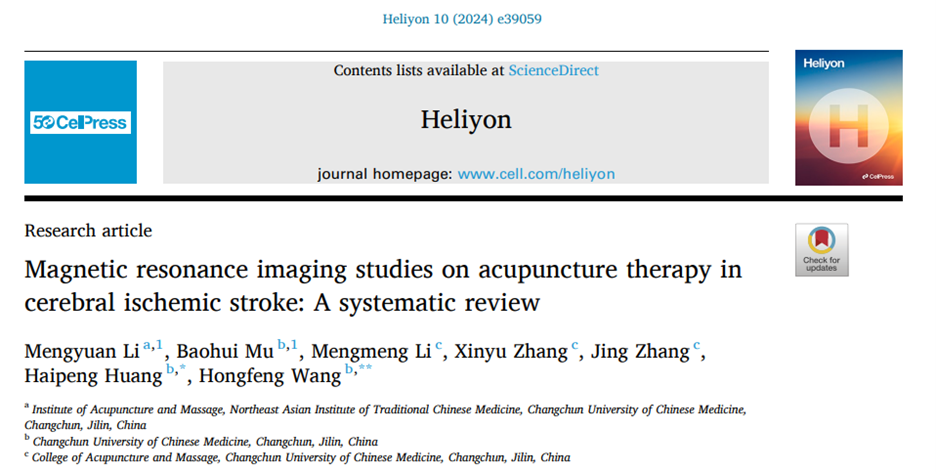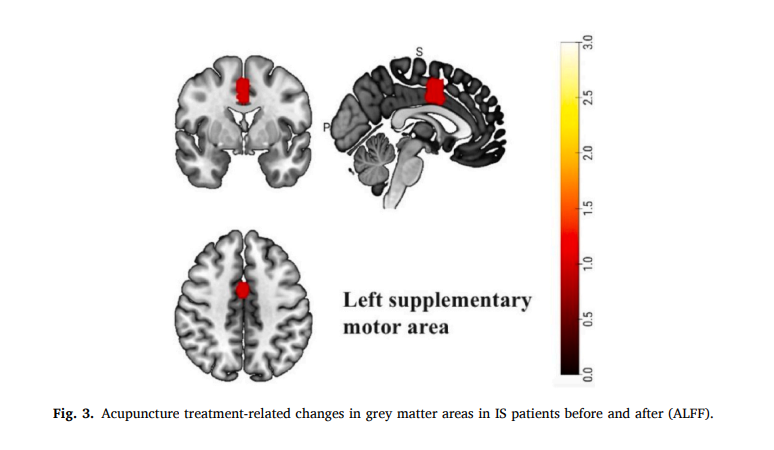Acupuncture and Neuroplasticity
The brain's capacity to remodel itself and create new synaptic connections in reaction to experience, education, and trauma is known as neuroplasticity.
The brain is adept at changing and adapting to new experiences. The brain's reaction to its surroundings is characterized by neuroplasticity, which includes dendritic remodeling, synapse turnover, long-term potentiation (LTP), and neurogenesis.
A large amount of studies considered that acupuncture plays a therapeutic role by facilitating neuroplasticity. Various diseases for which acupuncture is known to be effective are neurodegenerative diseases, pain, mood disorders, and many others.
In this article I will show you the relationships of Acupuncture and Neuroplasticity as the points below.
Neuroimaging studies on the interaction between acupuncture and neuroplasticity
Effect and mechanisms of acupuncture on neuroplasticity in neurodegenerative diseases
Effect and mechanisms of acupuncture on neuroplasticity in acute and chronic pain
Effect and mechanisms of acupuncture on neuroplasticity in mood disorders
Neuroimaging Studies on the Interaction between Acupuncture and Neuroplasticity
Magnetic Resonance Imaging (MRI) has been used in research to better understand how acupuncture affects neuroplasticity after ischemic stroke (IS).
As an advanced visualization method, MRI can help better understand acupuncture's mechanism. In the clinical literature included in this study, functional MRI (fMRI) was applied as the primary test method, and the main analysis methods included Regional Homogenity (ReHo), Fractional Amplitude of Low-Frequency Fluctuations (f)ALFF, Functional Connectivity (FC), and Independent Component Analysis (ICA). The meta-analysis's findings showed that acupuncture is a highly effective treatment for IS. Furthermore, it has been discovered that acupuncture alters ALFF and ReHo in particular brain regions, such as the left inferior network, left cerebellum, right inferior frontal gyrus, and left inferior frontal gyrus. These regions are closely associated with motor functions, sensory processing, language, and emotional information.
From these findings it is implied that acupuncture can potentially facilitate the reversible restoration of impaired neurological functions through using MRI to shed light on the interaction between acupuncture and neuroplasticity.
Effect and Mechanisms of Acupuncture on Neuroplasticity in Neurodegenerative Diseases
Neurodegenerative diseases, including stroke, Alzheimer’s disease (AD), and Parkinson’s disease (PD), have a common pathological factor, which is the massive death of neurons. For neurodegenerative diseases, previous studies have reported the phenomena of raising enhanced adult neurogenesis by acupuncture.
Acupuncture and Stroke
Some of the effects and mechanisms of acupuncture on neuroplasticity in stroke are acupuncture affects the increment of blood perfusion in injured brain areas, reduction of the inflammatory reaction, stimulation of neuronal cell reorganization, and restoration of neural plasticity.
Furthermore acupuncture can not only inhibit the activation and infiltration of inflammatory cells, but can also regulate the expression of inflammation-related cytokines, balance the effects of pro-inflammatory and anti-inflammatory factors, and interfere with inflammatory signaling pathways.
Read more about Scientific Proof to How Your Body React to Acupuncture for Stroke here.
Acupuncture and Alzheimer’s Disease
Oxidative stress acts an increasingly crucial role in the pathogenesis of Alzheimer’s Disease (AD). Acupuncture ameliorates AD by suppressing the effects of oxidative stress. Acupuncture can reduce oxidative stress and reduce neuroinflammation through multiple signal transduction pathways, Aβ Production, aggregation, and phosphorylation of Tau.
Another mechanism is acupuncture can improve the symptoms of AD patients by inhibiting the apoptosis of nerve cells in a variety of ways and pathways. On the one hand, increasing the synthesis of antioxidants, and on the other hand, reducing the generation of oxidative stress products, thereby exerting a protective effect on nerve cells.
Read more about Scientific Proof to How Your Body React to Acupuncture for Alzheimer’s Disease here.
Acupuncture and Parkinson’s Disease
There are several mechanisms in the progression of Parkinson’s Disease (PD).
Misfolding and accumulation of α-synuclein lead to a sustained and uncontrolled endoplasmic reticulum stress response, which in turn activates autophagy and apoptotic signaling in cells and causes apoptosis, mitochondrial dysfunctions and oxidative stress. Neuroinflammation was involved in the pathogenesis and disease progression of PD.
Acupuncture has been beneficial for PD through countering the mechanisms of the progression of PD. The mechanisms include enhancing protein degradation pathways by timely removal of excessive α-synuclein in the matrix and extracellular matrix of nerve cells can protect cells from toxicity, enhanced mitochondrial function and reduction of oxidative stress by increasing the content of glutathione which is an important antioxidant can play an effective role in treating PD.
Read more about Scientific Proof to How Your Body React to Acupuncture for Parkinson’s Disease here.
Effect and Mechanisms of Acupuncture on Neuroplasticity in Acute and Chronic Pain
Differences between Acute and Chronic Pain
Acute pain is usually a sudden, short-lived pain experience, in which pain signals are transmitted from injured tissues to the central nervous system (CNS), activating brain regions associated with pain perception and triggering corresponding physiological and behavioral responses.
Pain caused by injury or illness is considered chronic if it lasts for more than three months. Chronic pain has more complex and persistent manifestations and symptoms than acute pain.
Both acute and chronic pain activate certain common brain regions, but chronic pain affected a wider range of brain regions because of its persistence, complexity, and accompanying symptoms. In particular, chronic pain involved more areas of the prefrontal cortex (PFC), limbic system, and basal ganglia, further underscoring the widespread effects of chronic pain on the CNS. Chronic pain differs from acute pain with regards to the implicated neurologic mechanisms, mainly related to the duration of pain and extent of its effects on the nervous system. Also chronic pain is often accompanied by numerous comorbid symptoms and conditions, such as mood disorders and cognitive decline.
Acute pain induces depressed mood, while chronic pain is known to cause depression. Pain and depression independently induce long-term plasticity in the central nervous system.
Chronic Pain Impact on Neuroplasticity
From a neurologic perspective, pain signals triggered by chronic pain activate more brain regions, including the PFC, limbic system, and basal ganglia. These brain regions play important roles in pain perception, emotional regulation, and attention control.
PFC is involved in the cognitive processing and emotional regulation of pain, the limbic system in the attentional and emotional responses to pain and the basal ganglia in the motor and behavioral responses to pain.
Chronic pain not only affects the CNS at the perceptual and cognitive levels, but also induces a wide range of physiological and psychological changes. Long-term pain stimulation can cause plasticity changes in the CNS, making the transmission of pain signals more sensitive and resulting in increased persistence and prolonged duration of pain. Therefore, the therapeutic approach to chronic pain needs to consider its extensive effects on the CNS.
Acupuncture Modulation on Neuroplasticity in Acute and Chronic Pain
Acupuncture inhibits pain signal transmission at peripheral and central systems by activating different patterns of afferent fibers located on various layers of acupoints.
At higher nerve centers, acupuncture inhibits neuronal activation in pain-related brain regions in the frontal, parietal, and temporal lobes, with key areas including the limbic system consisting of anterior cingulate cortex (ACC), insula, prefrontal cortex (PFC), hippocampus and primary somatosensory cortex (S1). These are the brain regions related to pain, emotional processing, pain perception and memory.
Acupuncture is shown to alter the functional connectivity of the ACC, leading to a reduction in the emotional and cognitive components of pain. Molecularly, this effect is associated with the regulation of neurotransmitters, such as serotonin and dopamine, which are involved in mood and pain modulation. The insula integrates sensory and affective aspects of pain. The hippocampus, associated with memory and emotional responses, also shows altered activity patterns under acupuncture. These alterations in the limbic system emphasize acupuncture’s capacity to regulate both the sensory and emotional aspects of pain, offering a more holistic approach to pain management.
Effect and Mechanisms of Acupuncture on Neuroplasticity in Mood Disorders
Mood disorders can have a wide range of psychiatric illnesses. Some common mood disorders that are prevalent in today’s society are depression, anxiety, post traumatic disorders.
Read more about Scientific Proof to How Your Body React to Acupuncture for Depression here.
Read more about Scientific Proof to How Your Body React to Acupuncture for Anxiety here.
Acupuncture Modulation on Neuroplasticity in General Mood Disorders
Studies suggest that acupuncture can influence neuroplasticity for mood disorders through its effects on the brain’s limbic system, prefrontal cortex, and autonomic nervous system. Research has shown that acupuncture stimulates the release of endogenous opioids and modulates the activity of neurotransmitters such as serotonin and dopamine. These changes can enhance emotional regulation and reduce stress responses, which are often dysregulated in most mood disorders. Moreover, acupuncture has been shown to promote the growth of new synapses and improve the brain’s ability to recover from trauma.
Many studies have highlighted acupuncture’s role in promoting neuroplasticity, and this includes in regions of the brain associated with stress regulation, such as the hippocampus and amygdala. These brain areas are heavily implicated in the development of mood disorders, where hyperactivity of the amygdala contributes to heightened fear responses, and the hippocampus, responsible for memory, becomes impaired in its ability to differentiate between safe and dangerous stimuli.
Furthermore, acupuncture helps to regulate the hypothalamic-pituitary-adrenal (HPA) axis, the body’s central stress response system, which is often overactivated in individuals with mood disorders. By modulating this system, acupuncture can help reduce the physiological hyperarousal leading to improved sleep and greater emotional stability.
Acupuncture Modulation on Neuroplasticity in Depression
Acupuncture has a significant effect on depression. The mechanism of acupuncture in treatment of depression based on hippocampal neuroplasticity is via promoting neuronal regeneration, improving synaptic plasticity efficiency, and repairing astrocytes structure and function. Acupuncture can regulate neural plasticity at multiple levels. It can not only directly repair the structure of neurons and glial cells through acupoint stimulation, but also indirectly participate in the regulation of neural plasticity through monoamine neurotransmitters, glutamate receptors and related protein-mediated signaling pathways.
Conclusion
Acupuncture, as a complementary therapy, is widely used in clinical practice to treat pain, neurodegenerative diseases and mood disorders. Although numerous studies have attempted to analyze the potential effects of acupuncture, the mechanisms are not yet fully understood. As a potent form of peripheral sensory stimulation, acupuncture may influence pain and neurodegenerative diseases by affecting neuronal plasticity. Neuroplasticity, which includes dendritic remodeling, synapse renewal, long-term potentiation (LTP), and neurogenesis, plays a role in brain development, skill learning, memory formation and extinction, and self-repair of neuronal injuries.
With the ability of acupuncture to modulate neuroplasticity, this would have meant that on a wellness and longevity level, acupuncture has the capacity to enhance any brainwork, including improve sharpness and alertness, increase memory power, rewiring of old damaging habitual thinking. In other words, personality development and character building are also within the wide scope of benefits that acupuncture can bring with its impact on neuroplasticity.
Read more about Acupuncture for Trust, Acupuncture for Motivation, Acupuncture for Compassion here.
Further Reading:
Everything You Need to Know About Acupuncture
TCM Explains and Heals Weird Habits that are Actual Signs of Mental Illnesses
Natural Alternatives or Chemical Drugs?
If You Are Having a Hard Time Now
Spirituality is Physics, Acupuncture is Science
Everything you need to know about Acupuncture
Holistic Treatments for High Functioning Anxiety
The Grass is Not Always Greener on the Other Side
Everything you need to know about Acupuncture
Testimonial for Sleep Improvement
Facial Acupuncture - How to differentiate the real deal from the fakers








